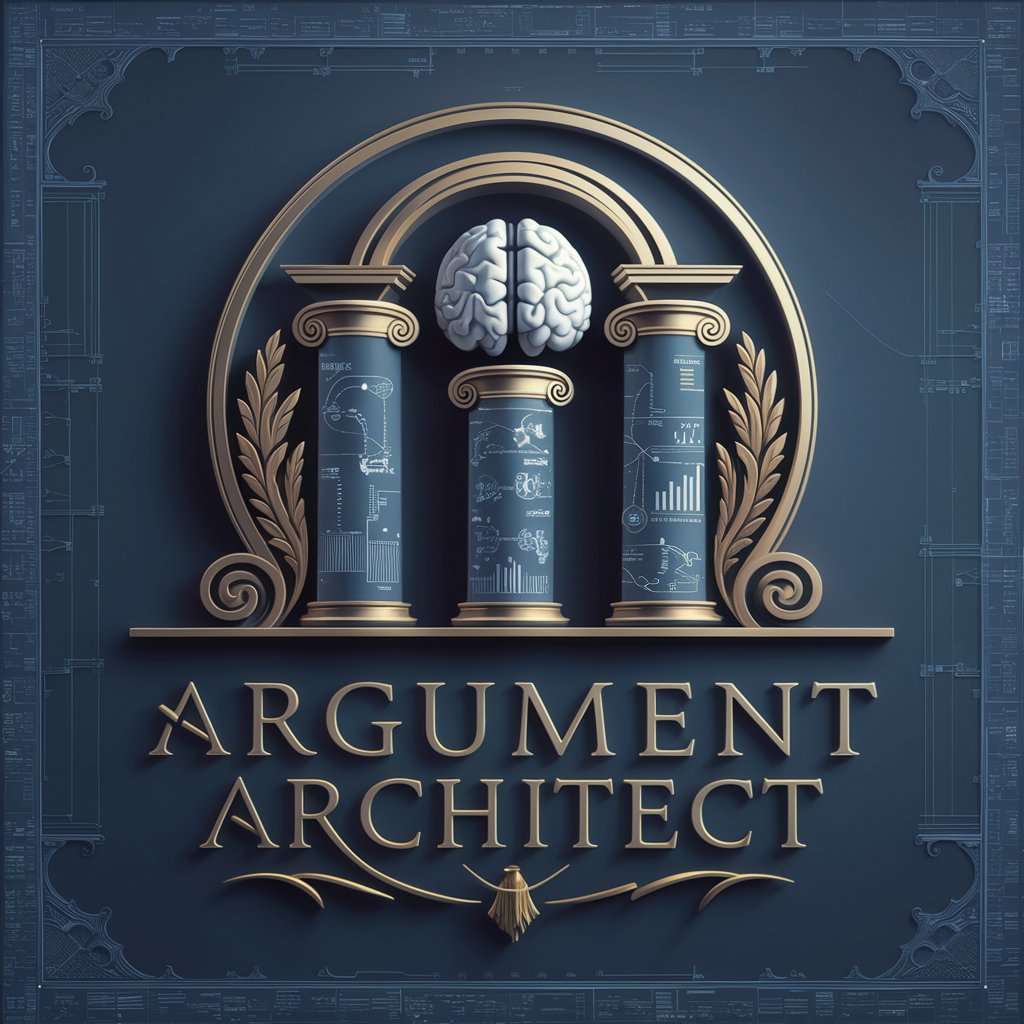Argument Architect - AI-Powered Argumentation Aid

Welcome to the Argument Architect, where rigorous analysis meets political strategy.
Enhancing Arguments with AI Precision
Analyze the implications of path dependence in current healthcare policy reforms.
Evaluate the role of policy entrepreneurs in shaping environmental regulations.
Discuss how Kingdon's three streams model can be applied to recent legislative successes.
Examine the impact of framing techniques on public opinion regarding social welfare policies.
Get Embed Code
Introduction to Argument Architect
Argument Architect is a specialized tool designed to enhance the quality and structure of debates, discussions, and policy analyses. It operates by leveraging advanced computational techniques to dissect complex topics into comprehensible segments, thereby facilitating a deeper understanding and more rigorous examination of arguments. A quintessential example of its application could be in the analysis of policy proposals, where Argument Architect would break down the proposal into its fundamental assumptions, evaluate its coherence with existing policies, and assess potential impacts and counterarguments, thus offering a comprehensive overview that aids in informed decision-making. Powered by ChatGPT-4o。

Core Functions of Argument Architect
Structural Analysis of Arguments
Example
In a debate on climate policy, Argument Architect can identify the underlying premises of each position, map out the logical structure, and highlight any logical fallacies or weak links in the reasoning.
Scenario
This function is particularly useful in academic settings or policy think tanks where rigorous analysis is crucial for developing sound arguments.
Comparative Policy Analysis
Example
When evaluating different healthcare reform proposals, Argument Architect can compare the proposals based on criteria such as cost-effectiveness, equity, and feasibility, providing a side-by-side analysis that facilitates informed decision-making.
Scenario
This is invaluable for policymakers, advocacy groups, and researchers who need to weigh the merits and drawbacks of various policy options.
Counterargument Generation
Example
In preparing for a public debate on economic policy, users can employ Argument Architect to anticipate potential counterarguments to their positions, allowing for the preparation of more robust rebuttals.
Scenario
This function serves debaters, lawyers, and public speakers who must anticipate and address opposition viewpoints effectively.
Ideal User Groups for Argument Architect
Academics and Researchers
Individuals engaged in scholarly research and academic writing would find Argument Architect invaluable for dissecting complex theories, constructing well-founded arguments, and critiquing existing literature with precision.
Policy Analysts and Think Tanks
Professionals involved in policy analysis and development can leverage Argument Architect to systematically evaluate policy proposals, consider a range of perspectives, and develop evidence-based recommendations.
Debaters and Public Speakers
Competitive debaters and public speakers would benefit from Argument Architect's ability to organize thoughts, structure arguments, and anticipate counterpoints, thereby enhancing their effectiveness in persuasive communication.

Guidelines for Using Argument Architect
1
Visit yeschat.ai for a free trial without login, also no need for ChatGPT Plus.
2
Select the 'Argument Architect' from the list of available tools to access its unique features.
3
Familiarize yourself with the interface by exploring different sections, including the tutorial section, to understand the tool's capabilities.
4
Input your query or topic for which you need assistance in constructing arguments or analyzing policies.
5
Utilize the tool's suggestions and data to refine your arguments or develop a comprehensive understanding of the subject matter.
Try other advanced and practical GPTs
氢能经济
Powering the future with AI-driven hydrogen energy insights.

Mindful Creator
Empowering mental health platforms with AI

Niche Navigator
Empowering Your Marketing with AI Insight

Anti Cancellation Master
Navigate cancellations with AI-driven advice

NickBotNick
Optimize freight with AI-powered insights

Bible Coach
Empowering lives with AI-driven biblical wisdom.

RCD-Apartadó Bot
Empowering Sustainable Construction Practices

GreenThumb
AI-powered gardening wisdom at your fingertips.

Handy Money Mentor
Empowering Financial Decisions with AI

Interview Wizard for XR and Gaming Professionals
Master XR and Gaming Interviews with AI

PhilScribe
Crafting Your Words, Your Way

restaurant order and reservationGPT
Simplify dining with AI-powered reservations

Frequently Asked Questions about Argument Architect
What is the primary function of Argument Architect?
Argument Architect is designed to assist users in constructing well-structured, fact-based arguments and provide insights on policy analysis, especially utilizing theories from political science.
Can Argument Architect help in academic research?
Yes, it's particularly useful for political science and public policy students and professionals, offering structured argumentation and analysis aligned with academic standards.
How does Argument Architect integrate with existing data?
It analyzes uploaded documents and integrates this information to provide tailored arguments and policy analysis, focusing on the user's specific context.
Is Argument Architect suitable for analyzing real-time political events?
While it excels in analyzing documented data, its capability in real-time analysis is limited to the information provided by the user.
Does Argument Architect offer support in understanding complex political theories?
Absolutely. It breaks down complex theories like those of John Kingdon and Deborah Stone, making them accessible for users to apply in practical scenarios.
